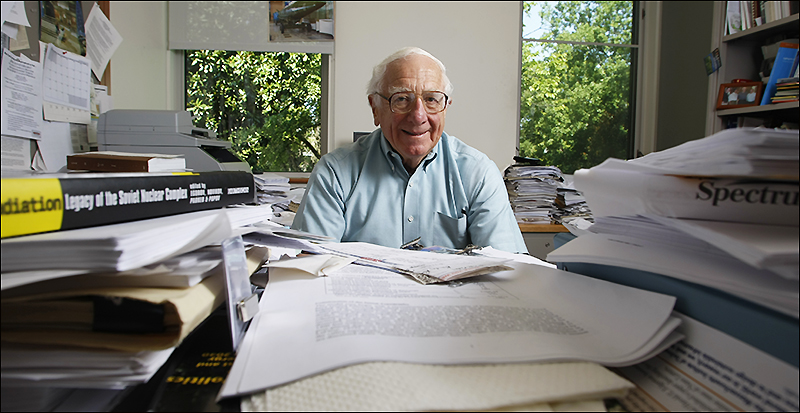
International nuclear waste management pioneer and member of the U.S. National Academy of Engineering, Frank L. Parker, 96, died Aug. 10, 2022, in Nashville, Tennessee. He was named Distinguished Professor of Environmental and Water Resources Engineering, Emeritus, and Professor of Civil and Environmental Engineering, Emeritus, in 2011 after a 43-year career at Vanderbilt University.
Parker generated seminal works in what are now seven distinct disciplines, ranging from hydraulics to law to the scientific foundations of the environmental sustainability movement.
At Vanderbilt, he initially concentrated on thermal pollution and water resources problems, but in later years he focused on radioactive and hazardous chemical waste problems, particularly in the former Soviet Union. He visited Moscow 30 times, beginning in 1964 at the height of the Cold War, a period of geopolitical tension between the United States and the Soviet Union and their allies.
“Frank Parker was a visionary leader in nuclear waste management whose expertise and kindness was appreciated and admired by his students and colleagues throughout the world,” said David Kosson, Gass Family Professor of Energy and the Environment.
As a nuclear waste remediation expert, Parker consulted with the U.S., Swedish, Japanese, French, Italian, German, Swiss, Indian, Pakistani, and the Soviet and Russian governments. He was a consultant and frequent visitor at the Chernobyl nuclear station in Chernobyl, Ukraine, in the former Soviet Union, after the 1986 accident and knew some of the early responders who removed their dosimeters before entering the reactor building so that they could continue to fight to bring the reactor under control. He also chaired an inquiry into the Three Mile Island accident for the National Council on Radiation Protection.
“Frank Parker was many things to many people,” said Sanjiv Gokhale, Engineering Endowed Director of Construction Management and professor of the practice of civil engineering. “To me he was a friend, a mentor and racquetball opponent for 20-plus years. I will sorely miss his humor and his wisdom.”
When Parker was 17, he enlisted in the U.S. Army and started classes at the Massachusetts Institute of Technology while waiting to be called to military service. He left the Army in 1946 and earned a bachelor’s degree in civil and environmental engineering from MIT in 1948. He went on to receive a master’s degree and Ph.D. from Harvard University in civil engineering. Over the next 11 years he held positions at the Oak Ridge National Laboratory and the International Atomic Energy Agency.
In 1967, already an internationally recognized expert in nuclear waste management, Parker joined Vanderbilt’s engineering faculty. From 1989 to 2011, he was a Distinguished Professor of Environmental and Water Resources Engineering.
Parker became the first Vanderbilt University faculty member to join the National Academy of Engineering after being elected. He presented invited papers at the Vatican’s Pontifical Academy of Sciences, the World Federation of Sciences annual meetings on Global Planetary Emergencies and the Blue Ribbon Commission on America’s Nuclear Future. He was a fellow of the American Association for the Advancement of Science and the first engineer elected by eminence to the American Academy of Environmental Engineers.
At Vanderbilt, he received the Alexander Heard Distinguished Service Professor Award and the Harvie Branscomb Distinguished Professor Award.
Andrea George, MS’94, PhD’07, assistant vice chancellor for environmental health and safety, said it was Parker who convinced her to pursue her graduate degrees at Vanderbilt — and later recruited her to the university.
“Dr. Parker was absolutely unique—ridiculously intelligent, fascinating, supportive, fun, kind and generous,” George said. “I frequently thank my lucky stars that I had the privilege to know him, and the world is definitely a little darker now without him shining bright.”
The son of Ukrainian Jewish immigrants, Parker is survived by brother Gerald, his children Nina Parker Ganz, Aaron, Stephan, and David, five grandchildren, and three great-grandchildren. He was preceded in death by his brother Arnold, and Elaine, his wife of 67 years, in 2021.
Memorials may be made in honor of Frank Parker to the Jewish Family Service of Nashville.
Contact: Brenda Ellis, 615 343-6314
brenda.ellis@vanderbilt.edu